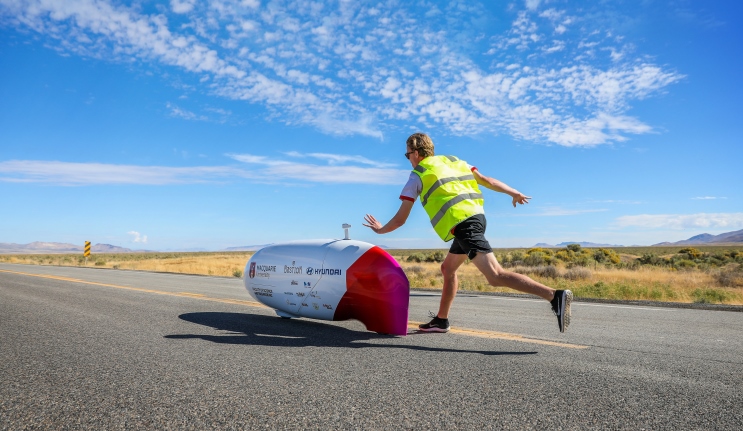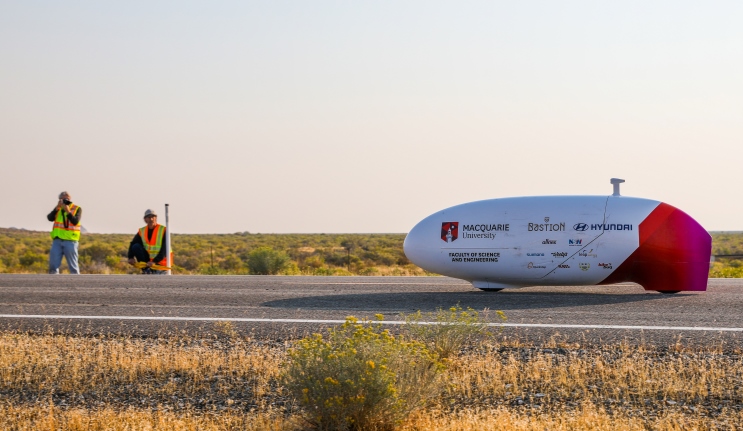
UNIVERSITY NEWS
MQ Speed
Macquarie became the first Australian university to send a team to Battle Mountain, Nevada, to compete in the 2017 World Human-Powered Speed Challenge. It’s just one way the School of Engineering is powering up and connecting its students with globally significant issues.
The MQ Speed team, comprising Macquarie engineering students, used state-of-the-art computational modelling, materials testing and physical testing on campus during a four-year development project to come up with what looks like, to the uninitiated, a bicycle crossed with a bullet.
And it’s not far off. Enclosed in an aerodynamic capsule, the human-powered vehicle has around 1/50th the drag of a conventional bicycle and, combined with high-gear ratios, can travel at speeds of up to 144 kilometres per hour.
The external structure is made of tough, lightweight carbon fibre that has no windscreen. Instead, the rider is able to see via mounted cameras and screens within the shell – riding the vehicle is not for the faint-hearted.
GREASED LIGHTNING
Macquarie alumnus and current Master of Research student Sajjad Saleh (Bachelor of Engineering (Honours), 2017), has been part of the six-person team who designed, constructed and tested the vehicle – known as MQ1 – for more than three years as part of their PACE (Professional and Community Engagement) unit.
“Our team covered the most kilometres and had the most successful launches – the vehicles need to be pushed for the first 15 metres until they have enough momentum to stay upright,” explains Sajjad, who was responsible for MQ1’s aerodynamic design.
“The rider, Charles Easton-Berry, reached speeds of up to 90 kilometres per hour and only had one crash, which he enjoyed. Safety is really important, so it was comforting to know that he could crash and emerge unscathed.”
The University of Toronto won the event with a speed of almost 129 kilometres per hour, but Sajjad says the record was not broken due to the cold, windy conditions.
“Everyone was very happy with the outcome. We only decided that the bike was ready a month before the competition, and then we had to raise the funds to get there. Fortunately, we were sponsored by Hyundai and Allnex, and supported by PACE and the engineering department. Currently we’re working on version two, so we can return with an even faster, more streamlined bike.”
ENGINEERING GROWTH
The success of the MQ Speed team is testament to Macquarie’s renewed focus on engineering, which is also exemplified in the launch of its School of Engineering in October 2017.
The new school, which is part of the Faculty of Science and Engineering, is aiming for rapid growth in staff, students and research output in coming years. In conjunction with an increasing level of engagement with corporate and government organisations, this will help Macquarie alleviate the current shortfall of graduating engineers in Australia.
Students will increasingly be involved in project-based learning, an approach designed to attract high-calibre students who want an experience, rather than just a grade. This innovative approach will also help produce graduates who provide immediate value to employers, thanks to their hands-on experience solving problems and working in teams to complete projects. They will also be exposed to experts from a range of backgrounds and industries, helping drive an entrepreneurial culture among our students and support the innovation economy.
It is full throttle from here.
Professional and Community Engagement (PACE)
At Macquarie, we want to produce alumni who are well-rounded individuals, have a global perspective and are equipped to actively promote more inclusive and sustainable societies. We believe our students need both a depth and breadth of understanding in a particular discipline.
Our PACE program provides a platform to apply the deep knowledge students gain from their studies to work in the real world.
As a Macquarie PACE partner, you can:
- access innovative, dynamic and motivated student thinkers to complete key projects
- enthuse students and their peers about the organisation and its line of work
- create a channel for finding and attracting bright new recruits
- inspire students and their peers about future career paths.
If you or your organisation would like to develop a mutually beneficial partnership with Macquarie and host our PACE students, contact us at pace@mq.edu.au or on +61 (2) 9850 6461.
